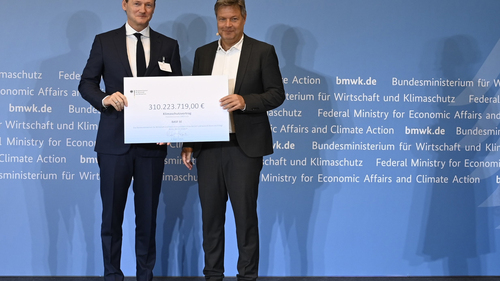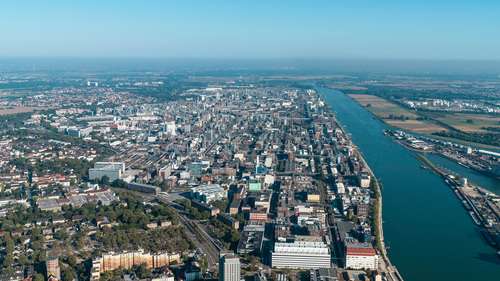BASF receives funding approval for the construction of the world’s largest industrial heat pump for CO2-free steam generation at Ludwigshafen, Germany
BASF has received funding approval from the German Federal Ministry for Economic Affairs and Climate Action for the construction of the world’s most powerful industrial heat pump. In the coming months, the company will therefore be able to start the preparatory construction work for the project at its Ludwigshafen site. The project is intended to make an important contribution to reducing CO2 emissions. Today, Robert Habeck, Federal Minister for Economic Affairs and Climate Action, presented the funding approval to Uwe Liebelt, President European Verbund Sites, BASF SE.
“Incorporating new technologies into our chemical production processes is one of the key components of the green transformation at BASF. And our heat pump even has a unique selling point: the planned plant will be the first of its kind to be used for steam generation – there are no comparable industrial pilot projects anywhere in the world,” says Markus Kamieth, Chairman of the Board of Executive Directors of BASF SE. “That’s why we are thrilled that the Federal Ministry is supporting our project and thus investing in new processes that play an important role in the development of sustainable value chains in the chemical industry.”
The planned heat pump will have a capacity of up to 500,000 metric tons of steam per year. The waste heat, which is used as a thermal energy source, is generated during the cooling and cleaning of process gases in one of the two steam crackers at the site. Powered by electricity from renewable energy, CO2-free steam is thus generated, and most of this steam is to be used in the production of formic acid. Here, the heat pump has the potential to reduce greenhouse gas emissions by up to 98 percent. A smaller proportion of the CO2-free steam is supplied to other BASF production plants via the steam network at the site. In total, the heat pump will reduce greenhouse gas emissions at the company’s headquarters by up to 100,000 metric tons per year.
“We are sticking to our climate protection goals: BASF aims to achieve net-zero CO2 emissions by 2050. We also aim to provide our customers with the best possible support on their transformation journey. Our Ludwigshafen site plays a key role in this regard. We want to turn it into a leading, sustainable chemical production site for Europe,” says Uwe Liebelt, President European Verbund Sites, BASF SE. “Electrifying steam generation is a crucial step towards generating the energy we so urgently need in the chemical industry in a more sustainable way. Our integrated Production Verbund is ideally suited to implementing and scaling up new technologies, such as the planned heat pump, on an industrial scale.”
The plant is scheduled to be commissioned in 2027. The German Federal Ministry for Economic Affairs and Climate Action is contributing up to around 310 million to the project as part of the Carbon Contracts for Difference funding program.
In addition to electricity, steam is one of the most important energy sources in the chemical industry. The Ludwigshafen site primarily uses it as process steam for production – for drying products, heating reactors, and for distillation, among other things. In the past year, BASF used about 14 million metric tons of steam in Ludwigshafen. By means of heat recovery from production facilities, BASF already meets half of the steam requirements at its main site using a low-carbon process. The other roughly 50 percent is currently generated by gas and steam power plants.
The green transformation is one of BASF’s key strategic cornerstones. In addition to using renewable raw materials and electricity from renewable sources, this transformation also includes testing and developing new technologies that reduce the use of fossil raw materials in energy production, thus enabling the manufacture of chemical products with a reduced carbon footprint. Examples of this transformation at the Ludwigshafen site include the water electrolyzer that is currently under construction and the demonstration plant for electrically heated steam crackers, which went into operation in April of this year.
Latest news
Hycamite’s technology to decarbonize shipping awarded AiP by industry leader DNV
Kokkola Industrial Park →Hycamite’s proprietary Thermo-Catalytic Decomposition (TCD) technology offers a new approach to producing clean hydrogen by breaking down methane, the primary component of liquefied natural gas (LN...
Clariant catalysts will power the Ecoplanta: Europe's first waste-to-methanol plant
Chemmed Cluster Tarragona →Repsol is building Europe’s first plant to produce renewable methanol from urban waste The facility will use Enerkem gasification technology to produce 240 KTA of methanol Clariant will supply cata...
Lilly plans to build a new $3 billion facility to boost oral medicine manufacturing capacity in Europe for patients worldwide
Netherlands site will bring 500 manufacturing and 1,500 construction jobs while further strengthening Lilly's global supply chain
Ports of Duisburg and Rotterdam advance energy transition together
Port of Rotterdam →With this LoI, the two major European logistics hubs reinforce their goal of jointly developing sustainable transport corridors via waterways as well as future-oriented initiatives for the energy t...


